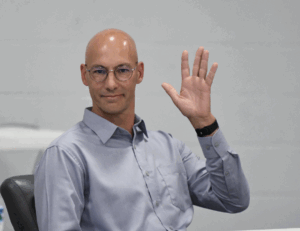
Dance of the facade
You have two choices when you are faced with a crisis.
You can meet it head on, have the tough conversations that are necessary, address the issues your agency, government entity or public body faces and the mistakes that have been made.
You can be honest.
You can be transparent.
You can be open and willing to talk about the real statistics, the real problems.
Then, you can enlist the community’s support to right the wrongs and make the changes.
Then, there is another approach.
You can dance.
You can answer some questions in a one-on-one setting, but when they get a little uncomfortable and you just aren’t getting the rah-rah positive spin you wanted, you can start the familiar chant.
“There are positives things going on in our county.”
“All the media prints is negative news.”
We saw examples of both approaches this week.
One is working. One is not.
Julie Metz is the former executive director of the Downtown Goldsboro Development Corp.
She has since gone on to a position working with development statewide, so she knows her stuff.
And in a few weeks, she and her family are leaving town — moving on to a new adventure.
But before she goes, she has a mission.
She is bound and determined to save Union Station.
The building, once a crown jewel in the plan for the revitalization of downtown Goldsboro and a prominent feature in discussions about creating high-speed passenger rail service in North Carolina, the building has become a sort of cast-off, and is disintegrating.
And, Metz says, the city’s management of state dollars it has been given in years past to develop Union Station is why.
Now, the landmark needs more than $1 million worth of work to shore it up and to put it back in the rail service discussion.
Metz brought her case to the council Nov. 6 — unapologetically, without worrying about hurting feelings or sugarcoating what needs to be done to move forward.
And she got the support this week from council members from both sides of the aisle – even those who think there has been too much money spent on developing the city’s center.
She got that council to allocate nearly $400,000 of what is needed to stabilize the train station.
Why? Simple. She did not pull any punches.
There were no excuses — no whining about how negative publicity would damage the city.
There was no trying to spin the mistakes into a positive to keep city leaders from looking bad.
And, most importantly, there was no suffering ego-centric bluster or power brokering that would inevitably dissolve into lining up yet another study with yet another chance for protracted debate and the real chance that nothing will get done.
Facts. Mistakes. Potential consequences. Solution.
That is how you get a city back on track.
The city’s new leadership team, when it is finally decided, needs to take note.
We don’t have time to play. Not anymore.
Big issues need honest and open discussion and action.
That’s the bottom line.
So now, let’s look at another presentation that took place Nov. 6.
This one was across town at the monthly meeting of the Wayne County Board of Education.
If you have read this site, you know that Wayne County Public Schools has been designated a low-performing district by the Department of Public Instruction.
You know about the facility problems.
You know about the teacher and bus driver shortages.
You know about the brutal fights inside local high schools.
But at that Monday meeting, the superintendent and the board of education made a show of parading the schools that did meet “expected growth” in a very public handshaking and back-patting display.
They pointed out how many were in the top 25 percent of schools that exceeded growth statewide and that two of them were in the top 5 percent.
And they summoned the administrators from the schools to their boardroom.
Lots of congratulations. Lots of hearty laughs and smiles.
And then came the words we have heard before.
“It is easy to publish the negative news,” Superintendent Dr. Marc Whichard said.
In case you were wondering, he was talking about us.
Later on in the meeting, board chairman Wade Leatham echoed the same sentiment.
Normally, we would just smile and move on.
We get this a lot. It comes with the territory.
But we think there is a teachable moment here. So, here it goes.
No, Mr. Superintendent and Mr. Board Chairman, it is not easy to report on the negative.
In fact, it is much more fun to look for the silver lining and to put out sunshine and rainbows.
It is much more difficult to have the conversations that are necessary to effect real change.
When the news is bad — and it is bad — talking about the bright spots is the easy out.
But standing up, addressing the mistakes and owning up to the hard road ahead — while answering the questions that are not so easy to hear — well, that is how you earn back the community’s trust.
So, here are the facts.
There are still a large majority of Wayne County students who are very, very far behind, and schools where the percentage of students who cannot read at grade level or do the basic math they need to advance is much, much too high.
There are disciplinary concerns as well as a looming teacher and bus driver shortage that is affecting education in the county.
That is not just negative news. That is a crisis.
And when you are faced with such a momentous hurdle, you should not be surprised when your community does not want to hear rah-rah and “there are positive things going on in Wayne County schools.”
They want to hear this: “What we have done in the past is not working, and we are committed to making the changes necessary to get that work done. Here is what is not working and here is what we are going to do about it.”
And, to be fair, we heard a bit of that Monday.
WCPS has devised improvement plans for each school and set districtwide improvement goals.
Whichard said Monday those goals include individual tasks for every senior leadership team member in the Central Office, as well as announced and unannounced visits to each school to make sure those goals are being met.
“One and done.”
That is what Whichard said his plan is for the “low-performing district” designation.
So, our advice?
Drop the fluff.
Address the issues and earn back the trust of a community that knows that there are serious concerns that need to be addressed.
And while you are at it, worry about the problems that are not really a secret anymore — not whether teachers are talking about their concerns to the media because they are afraid to speak publicly because you have sent out a missive that “unprofessionalism” will be “dealt with in time.”
And, perhaps, don’t hire your former chairman’s son’s company for a $24,000 contract to landscape schools — especially when the company’s address is that same board member’s home address and a pickup truck with a “Next Level Landscaping” vanity plate sits outside the district’s Central Office whenever Chris West is in the building.
And don’t shoot the messenger when you continually shoot yourselves in the foot.
Parents are not stupid, and neither are voters.
You can’t PR your way out of a problem like we have in WCPS.
You can’t avoid questions, spin press releases, and sanitize statements.
And you cannot, especially now, have discussions about important topics in nearly two-hour executive sessions behind closed doors — or two hours away over filet mignon and king crab legs on Ocracoke Island.
You have to talk about the hard stuff — the truth about the enormity of the task at hand — and show that when you say the word, “transparency,” you mean it.
And that means every board member, not just the chairman and superintendent.
Wayne County residents did not elect that high-priced, fancy Raleigh attorney who is your new touchstone.
They picked you.
So, if you want to earn the community’s support, do what you said you were going to do when you took the job.
Answer the questions — even the hard ones.
Acknowledge mistakes that were made and get to work.
Make personnel changes on campuses when you know — and we all know you know — current leadership is part of the problem.
That, not chirpy, self-produced board meeting coverage and PR parades that 18 people watch on a board YouTube telecast, are what is going to get enrollment up, scores up, and the real issues addressed.
So, Mr. Superintendent and Mr. Board Chairman, we will continue to do the hard work of holding the county school board and the people who serve this community accountable.
We are ready, willing, and waiting to start a new era of openness and accountability right now.
We won’t pull punches, and we don’t expect you to either.
That is how we get significant and lasting change — and how you measure real progress toward the goal of making Wayne County Public Schools better.
So, we’ll await your call.
And in the meantime, if you need an example of someone who was unafraid to acknowledge the warts because she knew transparency was the only way to take a step toward progress, watch Metz’s presentation on Union Station.
Once you do, you’ll see what leadership that yields results really looks like.
And maybe, just maybe, you’ll then have the courage to admit that your station is crumbling, too.
We think you’ll be surprised at the support that kind of honesty can generate for your plan to stabilize it.

A loaded discussion

Fighting for their lives

Goldsboro loses a giant

“I’m a flippin’ hurricane!”
Public Notices — Feb. 8, 2026

Belting it out

Legendary

Final Four!


